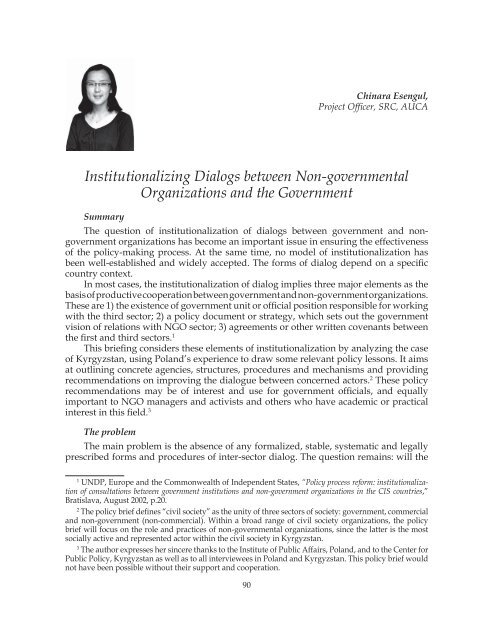KYRGYZSTAN TODAY Policy briefs on - Department of Geography
KYRGYZSTAN TODAY Policy briefs on - Department of Geography
KYRGYZSTAN TODAY Policy briefs on - Department of Geography
You also want an ePaper? Increase the reach of your titles
YUMPU automatically turns print PDFs into web optimized ePapers that Google loves.
Chinara Esengul,<br />
Project Officer, SRC, AUCA<br />
Instituti<strong>on</strong>alizing Dialogs between N<strong>on</strong>-governmental<br />
Organizati<strong>on</strong>s and the Government<br />
Summary<br />
The questi<strong>on</strong> <strong>of</strong> instituti<strong>on</strong>alizati<strong>on</strong> <strong>of</strong> dialogs between government and n<strong>on</strong>government<br />
organizati<strong>on</strong>s has become an important issue in ensuring the effectiveness<br />
<strong>of</strong> the policy-making process. At the same time, no model <strong>of</strong> instituti<strong>on</strong>alizati<strong>on</strong> has<br />
been well-established and widely accepted. The forms <strong>of</strong> dialog depend <strong>on</strong> a specific<br />
country c<strong>on</strong>text.<br />
In most cases, the instituti<strong>on</strong>alizati<strong>on</strong> <strong>of</strong> dialog implies three major elements as the<br />
basis <strong>of</strong> productive cooperati<strong>on</strong> between government and n<strong>on</strong>-government organizati<strong>on</strong>s.<br />
These are 1) the existence <strong>of</strong> government unit or <strong>of</strong>ficial positi<strong>on</strong> resp<strong>on</strong>sible for working<br />
with the third sector; 2) a policy document or strategy, which sets out the government<br />
visi<strong>on</strong> <strong>of</strong> relati<strong>on</strong>s with NGO sector; 3) agreements or other written covenants between<br />
the first and third sectors. 1<br />
This briefing c<strong>on</strong>siders these elements <strong>of</strong> instituti<strong>on</strong>alizati<strong>on</strong> by analyzing the case<br />
<strong>of</strong> Kyrgyzstan, using Poland’s experience to draw some relevant policy less<strong>on</strong>s. It aims<br />
at outlining c<strong>on</strong>crete agencies, structures, procedures and mechanisms and providing<br />
recommendati<strong>on</strong>s <strong>on</strong> improving the dialogue between c<strong>on</strong>cerned actors. 2 These policy<br />
recommendati<strong>on</strong>s may be <strong>of</strong> interest and use for government <strong>of</strong>ficials, and equally<br />
important to NGO managers and activists and others who have academic or practical<br />
interest in this field. 3<br />
The problem<br />
The main problem is the absence <strong>of</strong> any formalized, stable, systematic and legally<br />
prescribed forms and procedures <strong>of</strong> inter-sector dialog. The questi<strong>on</strong> remains: will the<br />
1<br />
UNDP, Europe and the Comm<strong>on</strong>wealth <strong>of</strong> Independent States, “<str<strong>on</strong>g>Policy</str<strong>on</strong>g> process reform: instituti<strong>on</strong>alizati<strong>on</strong><br />
<strong>of</strong> c<strong>on</strong>sultati<strong>on</strong>s between government instituti<strong>on</strong>s and n<strong>on</strong>-government organizati<strong>on</strong>s in the CIS countries,”<br />
Bratislava, August 2002, p.20.<br />
2<br />
The policy brief defines “civil society” as the unity <strong>of</strong> three sectors <strong>of</strong> society: government, commercial<br />
and n<strong>on</strong>-government (n<strong>on</strong>-commercial). Within a broad range <strong>of</strong> civil society organizati<strong>on</strong>s, the policy<br />
brief will focus <strong>on</strong> the role and practices <strong>of</strong> n<strong>on</strong>-governmental organizati<strong>on</strong>s, since the latter is the most<br />
socially active and represented actor within the civil society in Kyrgyzstan.<br />
3<br />
The author expresses her sincere thanks to the Institute <strong>of</strong> Public Affairs, Poland, and to the Center for<br />
Public <str<strong>on</strong>g>Policy</str<strong>on</strong>g>, Kyrgyzstan as well as to all interviewees in Poland and Kyrgyzstan. This policy brief would<br />
not have been possible without their support and cooperati<strong>on</strong>.<br />
90
















